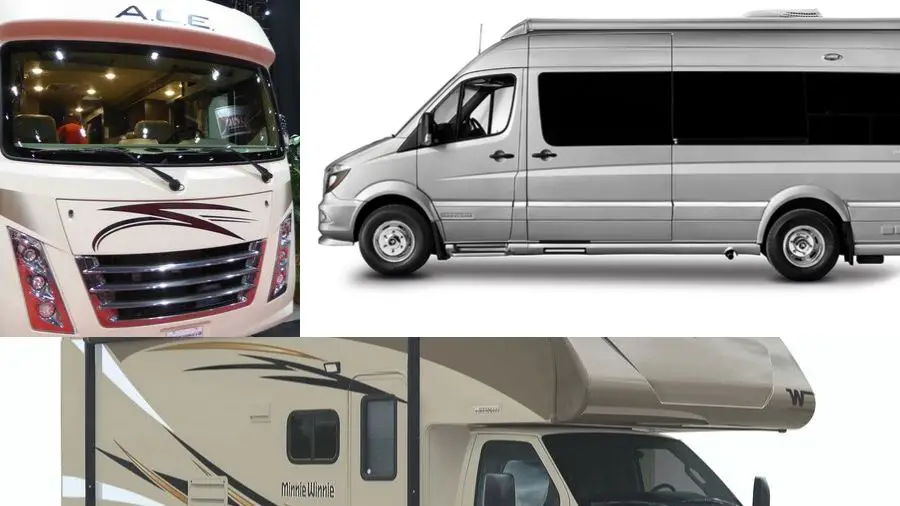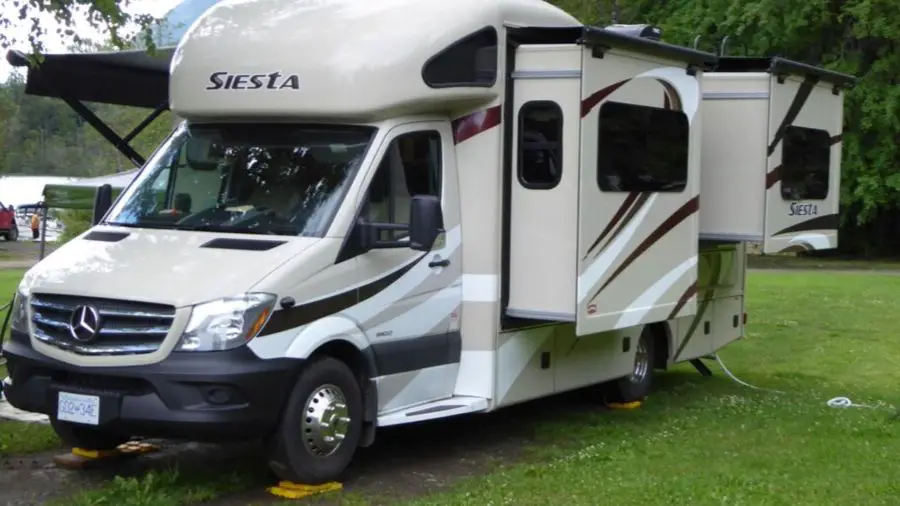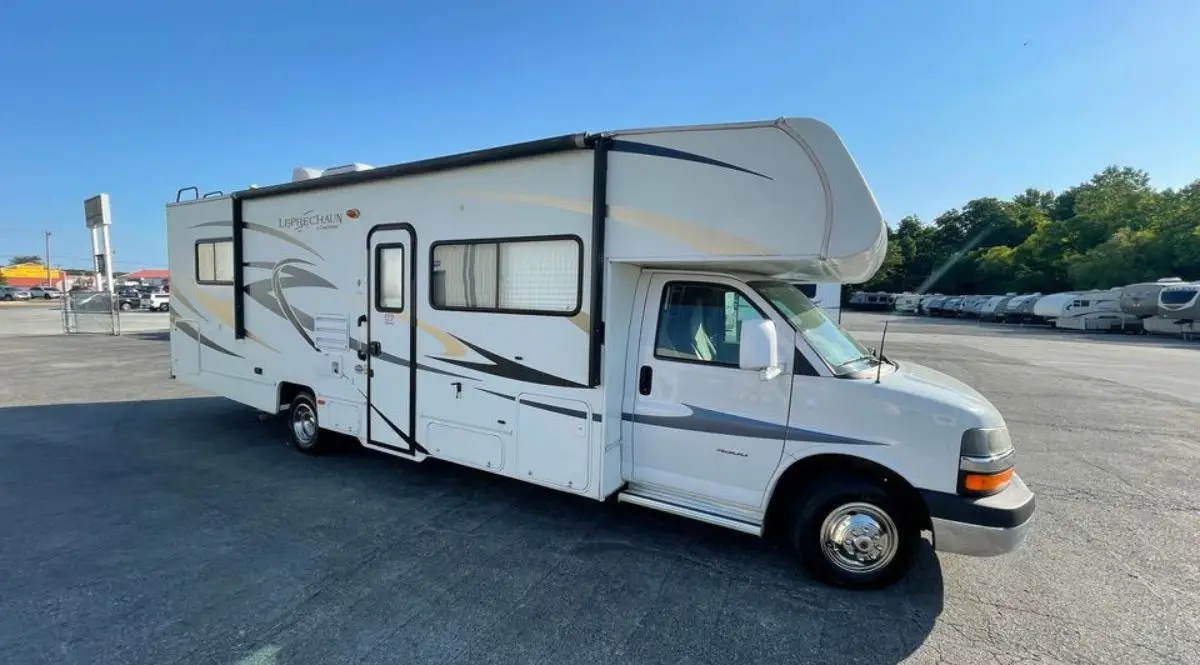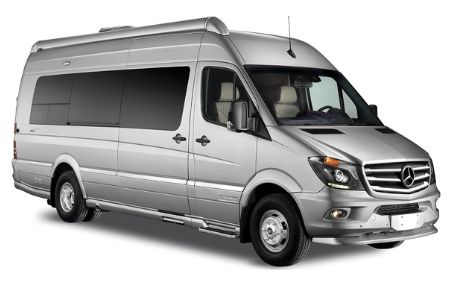23 Things you will need to know before you buy your first motorhome.
RV shopping can be overwhelming! It’s easy to get caught up in the floorplan, color scheme, and overall looks and make the kind of mistakes that first-timers make. Not every motorhome that looks great IS great, and buying a seemingly good motorhome can quickly snowball into a bad deal because of a little thing you overlooked.
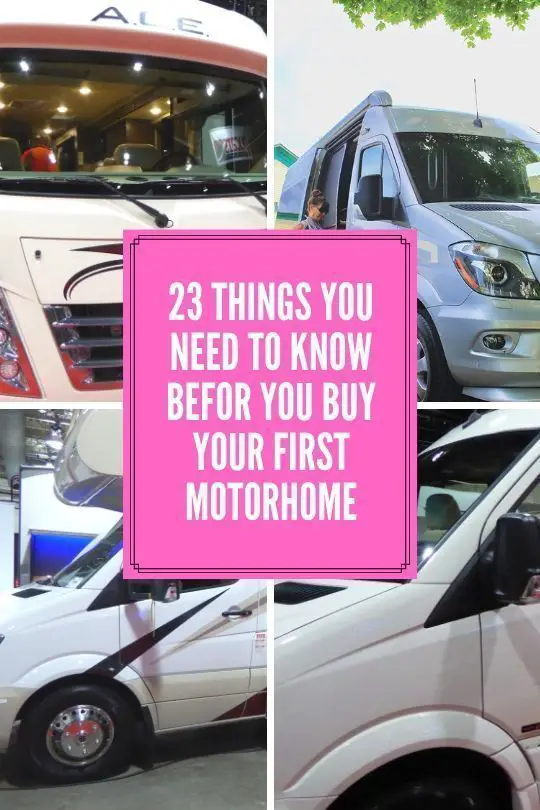
1. Know The Facts (it’s not the salesman’s fault)
When you visit a RV trade show or visit a show room full of RV’s it is hard not to start salivating at the nice new shiny new models. Then comes the salesman to help you. Before you know it you are talking and asking all kinds of questions and it all seems to be a yes to everything you ask. All good right? Well not really. It is better for you to do the research before making a purchase. On your first visit to a dealer or Trade show, collect information and get the facts on the models you like and do the research at home. Take your time and don’t be swayed by the discounts they are offering or the amazing financing. Plus, don’t rely solely on the salesman to provide you information on the manufacture and model you are interested in. Let’s just say we have different interests at heart. It’s not that they are making things up or being dishonest, but there are a lot of products on the market and eventually everything can blur together. Very often it is unintentional, but in the end it will be you who will be paying for the motorhome.
2. Is This Motorhome Well Built By A Reputable Company?
There are many manufactures out there. Many manufactures are building with the lowest quality and produce as many as they can to get them out the door. Quality issues can be abound in this industry. Once you have it off the lot, it really becomes your problem. Yes there are warranties and extra warranties you can buy, but in the end a lemon is a lemon. Better to do the research and take your time ask the questions early on than to regret the purchase and settle for the lemon or work to try to undo the mistake.
3. Ask Others About Their Experience
Look out for motorhome owners that own models and brands that you are interested in and ask about the company and the model. Ask about the problems they have had and the things they like the least. Ask them what they like most about the company or motorhome. Find out how long they have owned the motorhome. Ask even if they would buy this brand again in the future? Don’t make a decision on just asking a couple people. Ask at least 5 to 10 owners and you will start to get a really good feel about how the company operates and what others think about it. Remember, how others will be treated will be how you will be treated, no matter what the dealer tells you.
4. Test Drive Before Buying
Recently, I was at a RV trade show and I have heard more than one conversation where people would pull out their wallet and buy the RV without driving it and doing the due diligence. It’s like buying a house without having a home inspection or a brand new car without test driving it to make sure that it is a fit for your lifestyle. Ask if your could take it home for the night and drive it around some more on various road conditions to see if anything is coming loose or how it handles on different road conditions and speeds. How does it feel? Solid? Does it handle the way you expected? How does it handle rough roads?
5. Think Things Through & Talk It Over
Being impulsive is not always the best way to get the best deal especially earlier on in your search for a new or used motorhome. Sometimes it is best to have opposing views or playing devil’s advocate to make sure that making this purchase is the right decision. Don’t worry the deals almost always come again. Sometimes early on in the search you do see a good deal and miss it, but that is more rare than the norm. Yes, this industry is very hot at the moment, but that does not eliminate the fact that if you are impulsive, unexpected things can happen. If you really think this is a good deal, put $1,000 down to hold it for a few days while you do your research.
6. Gain The Wisdom Of Others
Ask other people in your sphere of people what to look out for, ask well as getting an insight into the ownership of a motorhome. Let them know that you are wanting to buy one and want to ask them some questions. RVers love sharing information on their experiences. They are a great bunch to get information from. Ask them the downsides and the upsides. What it’s like to live in one for a while, or traveling across the country. This is all part of building the history and experience through others.
7. Make A Checklist
After determining what features you need in an RV, the next thing to do is to list them in order of priority. Sometimes, you have to trade-off on what you want, the important part is to make sure your motorhome of choice has all your needs or fills as many of them as you can. Is your needs realistic for what you are wanting to spend?
8. Preliminary Inspections
RVs are usually driven or pulled to dealerships, putting some miles on it. Things may have jolted loose or squeak, especially if it has been to an RV show or has had many prospective buyers checking it out while on a lot. Dealers don’t fix things until they have a sale. Make sure these are not cosmetics issues that will affect its performance. Go through, check everything, look under everything, list everything that needs to be done before the dealer finishes the sale. One little problem may be a big deal later down the line. Check each electricity outlet, make sure the slides are flush so they slide in and out easily, check the refrigerator temperature, check the fireplace (if any), check the television, turn on the radio, turn the air conditioner on, pull the roller blinds up and down, check the window, check for leaks, check the fans, check the tanks if you have switchboards, check the exterior for any crack, check the engine for oil and make sure it does not smoke. Whatever is important to you, check it out! You might want to inform them days before that you are coming in to check the RV and spend at least six hours checking the RV. Go as a team with your family, or with an RV inspector if possible. A third opinion never hurts.
9. Financing And Depreciation
Financing options for RV’s always last as long as 15 – 20 years. By the end of that time, you would have paid more than $50,000 dollars more than the price of the RV to the financing institution if you buy a new RV.
Another factor to consider is depreciation. Generally, RVs, no matter the kinds of upgrades made to it, it will depreciate fast. An RV is, therefore, never an investment, whether you put in upgrades or not. As you use it year after year, the value goes down. It is these twin factor of financing and depreciation that makes some people opt for a used RV over a new one.
10. New Motorhome Or Used Motorhome?
Buying a new RV is going to give you fewer problems? That is a myth! If your new RV has an issue, it has to be taken back to the factory and may take a while before it is repaired. It’s well known that RVs are hot right now and motorhomes are one of the most mass produced. Manufacturers are cranking them out and you should think about the possibilities of problems, after all, RVs are complex houses on wheels. This, coupled with the fact that driving an RV is basically subjecting your home to an earthquake and that some RVs are not solidly built compounds the issue.
If you buy one that is one or two years, at least you can assume the owners have taken care of some of the headaches! But that is not to say used RVs are the best too, the wear and tear on a used RV can cause issues you have to fix. When you buy a used RV, it is buyer beware because you never know for sure what might be wrong or what you’ll have to fix in the future. These fixes can add up.
Then there are the Vintage Motorhomes. After about 15 to 20 yrs the depreciation has almost dropped to the lowest that it can and then starts to level off. Some vintage motorhomes have been babied and not driven much over the years and have many miles left on the motor and chassis. Others have been well used, have many miles on the engine and chassis and is closer to the end of life than one that has relatively few miles on them and have been well cared for through the years. This is the sweet spot for those who don’t mind an older motorhome, that might be a bit dated with regards to looks, but still have plenty of life in the whole vehicle. If you are handy you can opt for a Vintage RV make over to modernize a few things.
11. Do You Need A Towable Vehicle Or Trailer?
If you buy a Class A or Class C and like going to campgrounds or traveling long distances, you will most likely consider towing a vehicle. Having a small vehicle just makes getting around much easier. Another option is to tow a pair of motorbikes that can get you around as needed once camped. Finally, towing a trailer with all your toys such as kayaks and paddle boards. Remember that when you are towing, the mileage per gallon will decrease when you are towing and is dependant on the weight of your trailer or vehicle. Here is the general rule of thumb:
| Weight Of Trailer of Vehicle | Percentage drop in fuel economy |
| Under 2,500 lbs | 10-15% |
| 2,500 – 5,000 lbs | 15-25% |
| 5,000 lbs or more | 25-35% |
12. Gas Or Diesel Motorhome
Both diesel and gas RVs are very similar yet remarkably different. If you plan on towing, using a diesel-powered engine is typically better for the hose power. Though gas engines can tow fine, diesels tend to have a better gas mileage. Diesel motors tend to last much longer than gas, but the maintenance costs are also more expensive on the diesel. When gas motors break down, typically it is easier to find someone to repair it as opposed to diesel engines. Diesel motorhomes tend to depreciate a little less than their gas counterparts.
13. People & Beds
How many people will be using the RV determines almost everything. If you have children, parents and relatives, you need to keep track of how many people you can realistically fit in, the best big or long enough, will you constantly be making the dinette into a bed and then a table in a day? Some couches and dinettes are short so don’t assume that all dinettes will be usable as a bed. Also, not all adverts that a motorhome sleeps 8 means the motorhome actually sleeps 8 as it may not fit everyone. Bunk Beds in the overcab have restrictions as to weight and some are short as well so not everyone can sleep there. As a side note, if you have many people and will go on extended trips, you might want to invest in a motorhome with a washer and dryer.
14. Bring The Kids Along
This is a big decision for the whole family, it is always best to bring the kids along for the visit at some point to check out the motorhome you are interested in purchasing. The best time is usually near the end of the sale once you have done all the research and determined which models are the right size and fit for your family.
15. Weight
Weight is one of the most important factors in the kind of motorhome you choose. There is a yellow sticker on every RV that tells you the dry-weight and how much it can carry weight-wise. The importance of weight arises when you have to calculate how much water and propane you can carry. Furthermore, while some motorhomes have huge storage bays, the carrying weight of the RV prevents you from filling that space with as many things as you’d like. That way, huge storage bays should not be a deciding factor when buying, but the carrying weight, after all, that you can fit it there does not mean you can put it there. How much can you tow too? Too much weight also decreases the efficiency of the motorhome. Remember to factor in your own weight, that of your companions and your dog too!
16. Do You Have Sufficient Storage?
We all have stuff we want to bring along on our camping trips, from golf clubs, fishing rods, hiking boots, paddle boards, kayaks etc. The list can get long… So what do you really want to bring on your camping trips in your new motorhome? And is there enough storage for everything? Does the basement storage have pull outs? How much can you carry? These are all very important questions to ask before you pull out the checkbook.
17. Is There Enough Space For Everyone In Bad Weather?
Yes bad weather, inevitably when you are out camping, there will be bad weather and everyone is inside watching a movie or playing games. Is there enough space for everyone comfortably when everyone is inside for an extended period of time and not sleeping? What other activities are there to partake in when inside? Will you all be watching TV, on the internet or playing board games? Do the sliders fully expanded provide enough space for everyone?
18. Water heater that used multiple fuels sources
Typically Rv’s have had hot water tanks, but more recently instant hot water systems have been all the rage, and for good reason. There is must less wasted heat when not using the water, weather on the camp water or your internal storage, energy is not wasted keeping the hot water tank hot when not in use. Better yet having multiple fuels sources makes having hot water as needed more. If you don’t want the hot water in your water tank to take a long time to come through, then you need to know whether it is heated by gas or electricity or both. Focus on instant hot water systems. If you can, pick both. Generally, gas heat faster than electricity which takes more time to generate heat, but if your propane runs out I the middle of nowhere, you can always fall back on electricity.
Alternatively, you can install a tankless hot water heater so you never run out of hot water. Newer RV’s now have this and it also means less weight for your RV to carry around.
19. Storage Between Trips & Off Season
Don’t overload the donkey, ermm, the motorhome. you don’t need too much cumbersome gear. Some rig, fuel, and readiness are all you need as they say. You can be overwhelmed by the number of things you need and if you wait till you are ready, you won’t ever buy an RV.
Think about what you will take with you on journeys and where you will put it. Make sure the motorhome has a pantry to keep your food though, you can’t afford to have your food lying around. Pay attention to the type of storage, where it is and how easily accessible it is. Cabinets can only hold so much. It’s nice to know you have somewhere to put your extra stuff. If you will be boondocking a lot, get larger holding tanks and solar panels installed. Add more battery packs too.
The flipside you should also consider is if you have enough space at home to keep the motorhome, or somewhere to store it during the offseason and times when you are not using it. You might consider storage facilities which can be quite pricey, especially if the storage facility is far and you have to go a long way to ring it home should you wish to use it.
20. Look For A Kitchen That Fits
Cooking space for motorhomes is very minimal if you look at the layout, especially for Class B and C. Some motorhomes only have an oven and a spot to prepare your food, and not the kitchen island you’ve grown to love very much. However, newer models of motorhomes are now equipped with a full fridge and a large kitchen, so it may not be much of an issue if you are buying a newer model. If you know you will be cooking a lot or have a large family, go for an RV with a bigger cooking space. Plus are you going to do most of your cooking indoors or are you going to be setting an outdoor space to do your cooking outside? Most people opt for the outside option when the summer weather is ideal and the smell of cooking can be contained outside. Many new motorhomes now comes with a full external kitchen with a pass through fridge or another fridge that is for the outside kitchen.
21. Modern Technology & Entertainment
We can never undermine the importance of technology in making life easier, especially if you are RVing in the middle of nowhere. To keep in touch with the world, you may want to check whether it has WIFI or Cell boosters or both. If it does not, you should consider installing one. Check if it has solar panels too which are a reliable source of power, especially if you are RVing off-grid. Most RVs come with TV and Radio, but you should also check if it has a standard interior and exterior stereo system and speakers. Checking these help you get a reasonable idea of how much you will spend to make upgrades so you will not overshoot your budget. Perhaps you plan to do some work while on the road or you have a business that you can work anywhere. Having the right technology in Internet and cellular. Not to mention that a lot of the smart home technologies are now starting to show up in the newest Rvs that can monitor everything in your RV when you are out. It can even turn on your A/C when the internal temperature gets to a certain temperature so that your pet is not suffering from too much heat.
22. If You Are Handy You Can Save A Lot of Money
Inevitably something will breakdown in your motorhome. This is normal and to be expected. Most people rush to the dealership to fix whatever they need, but with a large price tag. The industry is currently very short on RV techs and the price to fix even the smallest things can be very costly. If you are familiar with fixing things around your house or your car or both. You can typically fix most things in your RV. However, if your warranty is not over take it to the dealer. Many of the manufacturers use the same parts and appliances in all their models, which for the most part can be found online and purchased for less online. Either way if you need to purchase from the dealer, the install can be pretty straightforward and can be a huge price savings.
23. For the Road
Drive slowly. Go slow when driving to avoid mistakes and accidents. Feeling rushed leads to poor decisions. Rushing doesn’t make you any faster.
Communicate with your companion in your RV, if any. Talk about roles, how to handle ugly situations, and go through steps
Know your measurement, i.e. how high your trailer is in case you want to go through tunnels. Know the length too especially for curving roads
Get prepared for boondocking – To stay in a recreational vehicle in a remote location, without connections to water, power, or sewer services.
Know your tanks – if you won’t be at a campground or be hooked up all the time, you might want to go for a bigger tank so you won’t be stranded. Clean your freshwater frequently too to avoid slime.
Traveling – make reservations and be careful about high traffic routes. Be flexible too. Allstays is a great app for planning your journey too
Keep documentation of your travel too – camera, videos, things that go rights and the ones that went wrong too
Patience. As a first time RV, you are going to have challenges. Patience is a virtue, at least until you get the hang of it.

